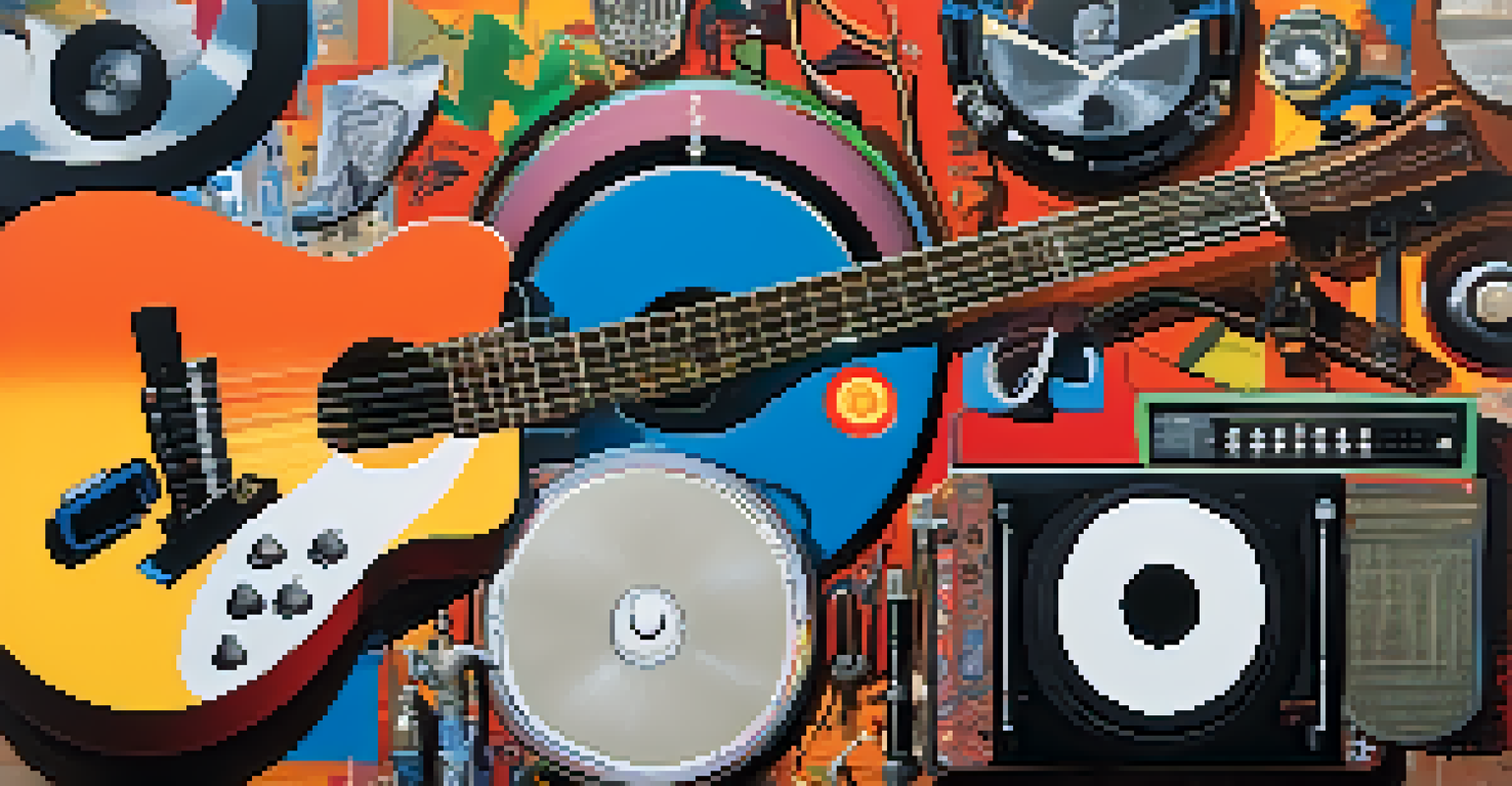Exploring Music's Role in Youth Identity Formation

Understanding Youth Identity: A Complex Journey
Identity formation during youth is a complex and dynamic process. It's a time when individuals explore various aspects of themselves, from beliefs to values, often influenced by external factors. Music plays a significant role in this journey, acting as both a mirror and a mold for young people's identities.
Music can change the world because it can change people.
As teenagers navigate their social landscapes, they often turn to music for expression and connection. Genres, lyrics, and artists resonate with their experiences, helping them articulate emotions they might struggle to express otherwise. This musical engagement not only shapes their identity but also fosters a sense of belonging among peers.
Ultimately, music serves as a soundtrack to their lives, influencing how they see themselves and how they relate to the world. It encourages self-discovery and experimentation, both crucial elements in forming a unique identity.
The Power of Lyrics in Shaping Self-Perception
Lyrics often resonate deeply with young listeners, reflecting their personal experiences. They can evoke emotions that make youth feel understood and less isolated in their struggles. For example, a song about heartbreak can validate feelings of sadness and encourage young people to process their emotions constructively.

Moreover, lyrics can challenge societal norms and empower youth to express their individuality. When young people hear messages of resilience, empowerment, or self-acceptance, it can inspire them to embrace their uniqueness and stand up against conformity. This connection to lyrics can be transformative, fostering a stronger self-identity.
Music Shapes Youth Identity
Music acts as both a mirror and a mold, helping young people explore and express their identities while fostering a sense of belonging.
In essence, the words of a song can become a young person’s personal anthem, guiding them through the complexities of growing up. This lyrical connection is pivotal in shaping how they perceive themselves in relation to their surroundings.
Music as a Tool for Social Connection Among Youth
Music often acts as a social glue, bringing young people together in shared experiences. Whether it's attending concerts, forming bands, or simply sharing playlists, music creates opportunities for social interaction. These moments can lead to lasting friendships and a sense of community.
Without music, life would be a mistake.
Additionally, youth often bond over shared musical tastes, which can serve as a foundation for their social identities. For instance, being part of a fan community for a particular artist or genre can provide a sense of belonging and validation. This collective engagement helps young people navigate their identities within a broader social context.
Thus, music not only influences personal identity but also fosters community ties. These connections are crucial as they contribute to a young person’s feeling of acceptance and understanding in a rapidly changing world.
The Influence of Genre on Identity Exploration
Different music genres often resonate with various aspects of youth identity. For example, punk rock may appeal to those expressing rebellion against societal norms, while hip-hop might connect with themes of empowerment and resilience. Each genre offers a unique lens through which young people can explore their identities.
Engaging with specific genres allows youth to experiment with different facets of themselves. They may adopt styles, attitudes, and even ideologies associated with the music they love. This exploration can lead to a richer understanding of who they are and who they want to be.
Lyrics Foster Self-Expression
The emotional resonance of lyrics allows youth to feel understood and empowers them to embrace their individuality.
Ultimately, the genre of music a young person gravitates toward can serve as a crucial part of their identity narrative. By aligning themselves with certain musical styles, they communicate their values, beliefs, and experiences to the world.
Music's Role in Navigating Cultural Identity
For many young people, music is a vital connection to their cultural heritage. It can serve as a bridge to their roots, helping them understand and embrace their cultural identity. Traditional songs, for example, often carry stories and histories that resonate deeply with youth, fostering pride in their backgrounds.
In multicultural societies, the blending of musical influences can also encourage youth to explore and celebrate diverse identities. Exposure to various genres and cultural sounds can broaden their understanding of the world and enhance their appreciation for different backgrounds. This musical exploration can lead to a more inclusive identity.
Thus, music becomes a powerful tool in helping young people navigate their cultural identities. It not only reinforces their connection to their heritage but also encourages openness to new perspectives and experiences.
The Impact of Music on Emotional Development
Music significantly influences the emotional development of youth, providing them with an outlet for expression. During adolescence, emotions can often feel overwhelming, and music offers a way to process and articulate those feelings. Listening to or creating music can be therapeutic, allowing young people to explore their emotional landscapes.
Moreover, music can help youth develop empathy by exposing them to diverse perspectives and experiences. Songs that tell stories of struggle or triumph can foster a deeper understanding and compassion for others. This emotional resonance can be instrumental in shaping a more empathetic and well-rounded identity.
Digital Age Transforms Music's Role
In the digital landscape, music consumption and creation have evolved, enabling youth to discover diverse genres and connect with global communities.
Therefore, the emotional connection to music not only aids in personal growth but also contributes to the development of social awareness. As youth navigate their emotions through music, they build a foundation for healthier relationships and emotional intelligence.
The Digital Age: Music's Evolving Role in Identity
In today’s digital landscape, music consumption and creation have transformed dramatically. Streaming platforms and social media allow youth to access a vast array of music, shaping their identities in new and exciting ways. This accessibility empowers them to discover niche genres and connect with global communities.
Additionally, platforms like TikTok have changed how music is shared and experienced, often creating viral trends that influence youth culture. These trends can shape identities, as young people engage with and participate in these cultural phenomena. The digital age has truly democratized music, allowing for unprecedented self-expression.

As youth navigate this digital music landscape, they continue to explore and redefine their identities. The interplay between technology and music fosters an environment where self-discovery and cultural exchange flourish, highlighting the ongoing evolution of music’s role in identity formation.